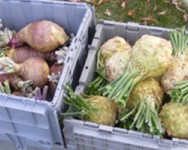Event Details
Date
Dec 6 - Dec 7, 2016
Time
Tues 8:30 AM - 5:00 PM; Weds 8:30 AM - 3:00 PM
Location
CCE Broome County
840 Front St
Binghamton, NY 13905
Cost
$65.00
Host
CCE Broome County
Amy Willis
607-772-8953
email Amy Willis
reg.cce.cornell.edu/2016gapstraining_203
Farm Food Safety Workshop (Broome County)
December 6 - December 7, 2016
Join Cornell Cooperative Extension of Broome County, the Cornell Vegetable Team, Cornell National GAPs Program and New York State Department of Agriculture & Markets, as we hear from Cornell University's Gretchen Wall of the National Good Agricultural Practices Program and the Produce Safety Alliance for a 2-day intensive workshop that will help you understand food safety risks and implement food safety practices on the farm.
The training covers the basic USDA GAPs and Harmonized GAPs programs, and will help farms implement solid food safety practices that mitigate risks and open new markets with institutions such as school districts, large retailers, and any other buyers that require GAPs Certification.
Day 1: Gretchen will offer growers an in-depth look at GAPs, how and where microbial contamination can occur, and how to use the GAPs standards to write a farm produce safety plan. An inspector from the New York Department of Agriculture and Markets will describe the GAPs audit and answer your questions about this procedure, should you choose to participate in an audit in the future.
Day 2: Writing your personal farm produce safety plan. Ag & Markets personnel will be back on Day 2 to field more questions about audits as you work through your plan.
On Day 2 you will need to bring a laptop with Microsoft Word. If you do not have a laptop, there will be a limited number of computers available for you to use in the computer lab - please let us know as soon as possible if you need to borrow one!
If you would like to bring along a more computer-savvy employee of your farm to help on Day 2, you are welcome to do so; the cost for each additional farm representative is $20 (to cover their lunch), and you can bring up to 2 additional representatives. Your registration includes lunch, snacks, coffee, a packet of food safety reference materials, and digital files of food safety resources.
Cost: $65. Register online. Pre-registration is required by December 2. Questions can be directed to Amy Willis, Market Readiness Educator at 607-772-8953.













































